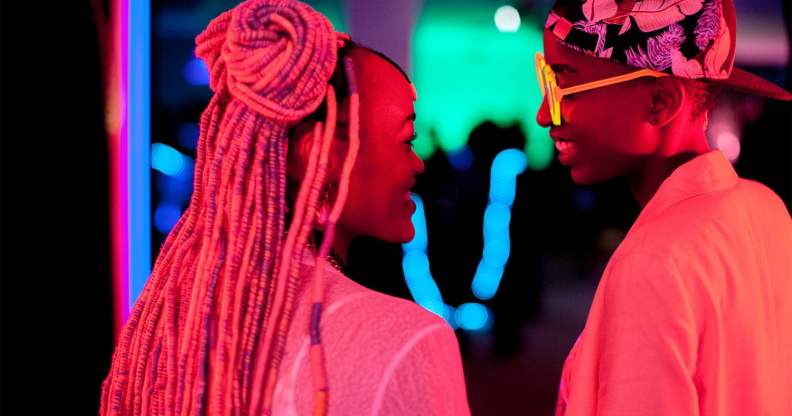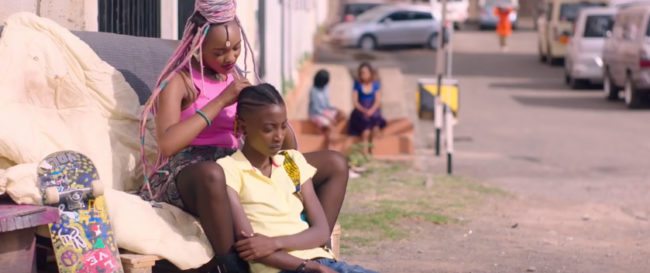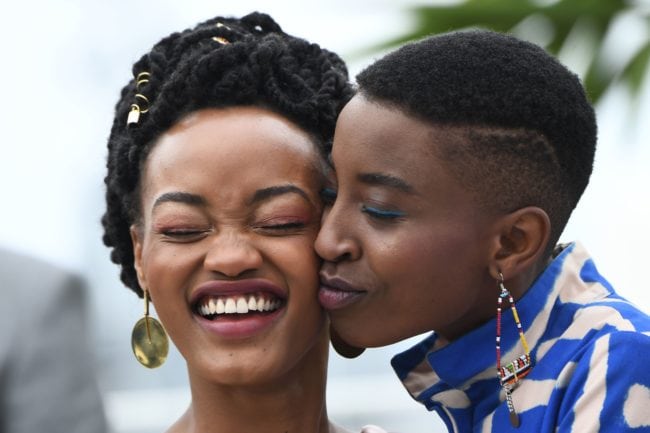Lesbian film Rafiki playing to sold-out crowds in Kenya after court lifts ban

The two main characters in Rafiki look at each other (Rafiki)
Screenings of lesbian film Rafiki are selling out in Kenya, after a court allowed it to be released for one week only.
The film had its first screenings on Sunday (September 23) in the wake of the Friday ruling, with a cinema in the capital Nairobi packed out for the occasion.
According to AFP, the start of the film was greeted by raucous applause from the audience at Prestige Cinema, while the crowd “laughed and booed” at the logo of the Kenya Film Classification Board—the body that suppressed its release.
The lesbian love story from director Wanuri Kahiu debuted to international acclaim at this year’s Cannes Film Festival, but the film was denied an official release in its home country after state censors took exception to the “homosexual” themes.
Kenya’s High Court agreed to quash the ban for seven days, allowing Rafiki to be screened for the exact minimum period required for it to be eligible for an Oscar nomination in the Best Foreign Language Film category.
Under Academy Awards rules, films in the category “must be first released in the country submitting it… and be first publicly exhibited for at least seven consecutive days in a commercial motion picture theater.”

The film was banned by Kenya because of its “homosexual theme and clear intent to promote lesbianism” (Big World Cinema)
The Nairobi cinema manager Celcius Aloo told AFP big crowds are expected for the rest of the film’s brief release given the attention it has garnered, adding: “I expect it to be full every day.”
Demand for the movie was so high that the cinema quickly upped the number of planned screenings, opening a second screen to cater to the influx of movie-goers.
Screenings are restricted to over-18s as a stipulation of the court order, though the film’s content is far from explicit. Rafiki does not include sex scenes.

(Big World Cinema)
Audience members who came to see Rafiki lavished it with praise.
Daisy Oriri told AFP: “It is really a victory… This is the kind of movie that makes it possible for mentalities to evolve, that makes people understand that we have rights and that we are human beings.
“It was a beautiful movie, it tells a part of my life.”

Rafiki actresses Sheila Munyiva and Samantha Mugatsia (ANNE-CHRISTINE POUJOULAT/AFP/Getty Images)
Others attending declined to give their full names, fearing harassment or persecution for even daring to attend the screening.
The bitter irony of the film’s international critical success despite the hostile reaction within Kenya was not lost on the movie-goers.
Mbithi Masya said: “This is the first Kenyan movie in history to get such international recognition. It is crazy to think that it was forbidden in its own country.

Rafiki director Wanuri Kahiu at the Cannes Film Festival (LOIC VENANCE/AFP/Getty)
“Every person has the right to love who he or she wants.”
The Academy Awards nominations are announced in January 2019.
Rafiki, a long shot for the Best Foreign Language Film category, is likely to be the only Kenyan film in contention.

